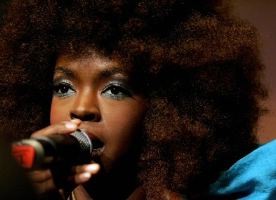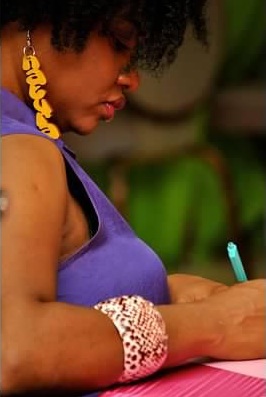 The Afro dates wayyy back but became really popular in the mid '60s. During the era when disco music, bell bottoms and chunky heels were in trend, the Afro hairstyle became the fashion statement that validated one’s fashion forwardness. The Afro, sometimes referred to as a “fro,” is a hairstyle worn naturally, usually by individuals with kinky or curly hair. The hairstyle is usually created by combing the hair away from the scalp in an upward and outward motion. The hair usually takes on a rounded shape and varies in height and length.
The Afro dates wayyy back but became really popular in the mid '60s. During the era when disco music, bell bottoms and chunky heels were in trend, the Afro hairstyle became the fashion statement that validated one’s fashion forwardness. The Afro, sometimes referred to as a “fro,” is a hairstyle worn naturally, usually by individuals with kinky or curly hair. The hairstyle is usually created by combing the hair away from the scalp in an upward and outward motion. The hair usually takes on a rounded shape and varies in height and length.
Two decades later, women began to move away from the “fro” fad and traded them in for chemically-processed hairstyles such as relaxers and perms. Women were no longer very comfortable wearing their natural hair and for a very long time only a small minority of women wore their hair that way.
Fast forward to today. Natural hair has begun to gain popularity in the hairstyling realm as there is again a rise in the number of women who are deciding to embrace their “natural roots.”
In addition to the vast number of persons who we see sporting their kinks and curls, there is also a significant number who are completely natural but are in the habit of wearing protective styles such as weaves, braids or even wigs. With that said, there is no denying that there is an increase in desire and decision to wear hair in its natural, God-Given state. With the wholesale transition also comes the extensive exposure to knowledge as to how to best care for hair in its virgin state. Books are written, blogs updated, videos uploaded and not to mention the informal one-on-one communication between individuals who share their tips and tricks with each other.
People want to know what are the best products on the market, how to achieve the best twist outs, how often to trim and a myriad of other things pertinent to natural hair. In all the dissimilation of information, there is not much emphasis placed on the subject of how to maintain an afro. I believe this is the case because there seem to be no technicalities involved in doing so. The truth is, like any other hairstyle, an afro needs to be properly maintained in order not to compromise the health of the natural hair. Achieving and maintaining an afro takes a bit of work and some amount of patience to get that flawless looking “fro” that is also in the best of health. There are some serious considerations to be made before, during and after wearing an afro.
BEFORE
1. Maximum Moisture
One of the most important steps to take before undertaking the wearing of an afro is to ensure that your hair is properly moisturized. Doing a deep treatment will provide the necessary moisture needed to achieve a soft, shiny afro that is pleasant to the touch. Contrary to popular belief, an afro is not always dry and rough-looking. I have had people ask to touch my hair and have seen them give that jaw-dropping reaction because they couldn’t believe that the hair was so soft despite being in an afro state. Using a leave-in conditioner is not an option when preparing your hair for a fro. The deep conditioner will prepare the hair and introduce moisture but the leave-in will actually, as the name suggests, remain in the hair and provide that extended and much needed moisture.

2. Diligent Detangling
Thorough detangling prior to wearing an afro is very vital. Hair that is not properly detangled stands the risk of becoming tangled and matted. This will give rise to the possibility of experiencing single strand knots. Trust me when I say that you do not want to encounter those little annoying knots. These are formed when the ends of the hair become wrapped around themselves making a loop and forming a knot. There is no known way of removing these knots except by cutting them off. So, unless you desire a close interaction with a pair of shears, then I suggest you take the necessary precaution and detangle diligently. The fact that the process of styling an afro involves combing out the hair, then it is only wise to ensure that it is fully detangled prior.
3. Timely Trimming
The secret to a perfect afro is getting it evenly shaped so as to achieve the rounded and smooth finish. If your hair has different lengths all over, it may not be as easy to accomplish that. There may be some need for trimming if your current hair length is not conducive to wearing an afro. Shedding an inch or so here and there may not be a huge sacrifice but if you find that it becomes necessary to do extensive chopping to obtain that picture perfect fro, then you just might want to reconsider if it is worth it. Persons who frequently wear an afro usually come to realize that they get much better results when their hair is shorter as opposed to when it is done on longer lengths. Analyze the situation to determine if your length is suitable to be styled in an afro.
DURING
1. Minimize Manipulation
Regardless of how you wear your hair, it is never a good idea to excessively manipulate your hair. When your hair is worn out as it is when sporting an afro, it is left at the mercy of the elements such as wind, sun, pollution etc. These can be very drying to your hair, making it brittle and more susceptible to breakage. Outside of the threat of damage there is also the frizz factor that can occur if the afro is touched over and over again. A messy and unstructured afro is not always cute unless that is the look you are going for. Low manipulation is the way to go as it relates to an afro.

2. Halt Hydration
Natural hair reacts to the application of water by shrinking. If your hair is being worn in an afro and having big and puffy hair is your goal then introducing water to it might not be the greatest idea. Achieving the perfect afro is not as easy as it appears. Water applied to your afro will pretty much bring you back to square one or give you a shorter more contracted version of it. While water is great on natural hair and is perhaps the best source of hydration, wisdom has to prevail if you intend to prolong your fro.
3. Cover Consistently
Afro should be wrapped or covered with a satin cap or scarf to protect your hair while sleeping. The fact that the ends of the hair are exposed when worn in an afro means that they are at risk for damage. Left uncovered, your afro may tangle or break when it comes into contact with the fabric used to make your bedding. The friction between your hair and the cotton-like fabric that most bedding is made of can cause breakage or split ends. Be consistent and cautious, being certain to cover your hair to both maintain and protect your afro.
AFTER
Pretty much the same steps that were taken before wearing an afro should be undertaken afterwards. Thoroughly washing and conditioning the hair to get rid of the buildup is a priority. Take special care when detangling as there may be tangles that were formed during the period in which the style was worn. In order to give your strands a much needed break, try to put it in a setting style that protects the ends of the hair. Twists, braids, and Bantu knots are a few options worthy of consideration. Applying products to restore moisture will prepare the hair for the next phase in your hair styling journey.

Candie's Natural Hairnamix was birthed a few months after Jamaican native Rossette "Candie" Allen began her natural hair journey in May 2010. She gears this column toward naturals, transitioning naturals, aspiring naturals and the naturally curious, sharing experiences, expertise and experiments while celebrating emancipation from chemical slavery.

